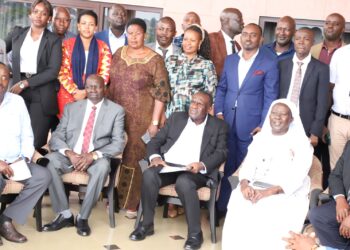Members of Parliament on the Legal and Parliamentary Affairs Committee have raised concerns over the Government’s proposal to merge the Tax Appeals Tribunal with the Electricity Disputes Tribunal into a single National Tribunal.
During a heated Thursday meeting, committee members questioned the logic behind merging two bodies that handle vastly different areas of expertise, citing potential complications in qualifications and case management.
Jonathan Odur, the MP for Erute South, was particularly vocal in his scepticism. He challenged the very definition of the proposal, arguing that the plan doesn’t qualify as a merger. “What is being proposed here doesn’t fit in, you can’t call it a merger, it may be something else as a concept, but it can’t fit in as a merger. Maybe you will help us understand this,” Odur said.
“How can you call this a merger when the document doesn’t present a unified component? There’s a speciality in tax law and a different speciality in electricity regulation. I don’t see the merger here.”
Chrystal Kabajwara, Chairperson of the Tax Appeals Tribunal, backed Odur’s concerns, emphasizing the need for harmonized qualifications under the proposed National Tribunal. “The current Tax Appeals Tribunal Act requires members to be either accountants or lawyers, while the Electricity Disputes Tribunal demands expertise in electricity distribution and transmission,” she noted. “You can’t have a tax professional preside over electricity disputes, so the qualifications must be widened to accommodate both tax and electricity matters.”
The MPs further questioned the practical implementation of the new Tribunal, especially in terms of its independence and operational structure. Odur expressed concerns about the Tribunal’s position within the Ministry of Justice. “You’ve mentioned that the Tax Appeals Tribunal is an independent body. But how does that work when the Attorney General, part of the Ministry of Justice, could also be a litigant? Doesn’t this create a conflict?” he asked.
Kabajwara highlighted additional challenges, particularly regarding the transition to the new structure. One glaring issue was the lack of compensation for current Tribunal members losing their positions, as outlined in clause 45 of the Bill.
She warned that this could lead to a worsened case backlog. “We already have around 600 cases in our backlog. If current members are not absorbed into the new Tribunal, the new members will have to rehear partially concluded cases, which will only prolong dispute resolution,” she explained.
The Chairperson also noted the Bill’s proposal to reduce the number of Tribunal members from eight to six. “If we reduce the number of members, it will significantly impact case management. Currently, we receive about 40 new cases each month, and over a year, that’s roughly 480 new cases. Without sufficient members, this will lead to an unmanageable backlog,” she cautioned.
MPs are now urging the government to reconsider the merger. They want to ensure that the unique qualifications and operational demands of each Tribunal are preserved to avoid a collapse of both systems.
Do you have a story in your community or an opinion to share with us: Email us at editorial@watchdoguganda.com













